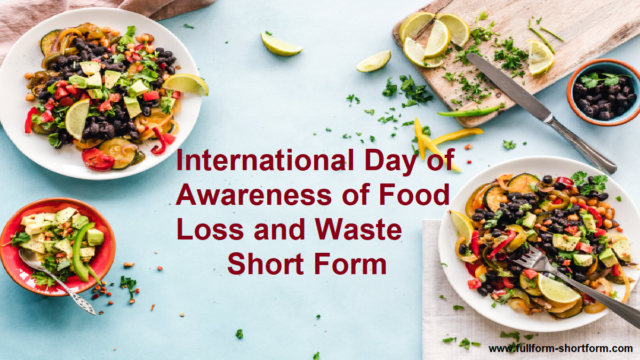Table of Contents
International Day of Awareness of Food Loss and Waste
The International Day of Awareness of Food Loss and Waste, observed annually on September 29th, serves as a poignant reminder of the critical issue of food loss and waste that plagues our world. Here, we delve into the significance of this day, explore the root causes of food loss and destruction, discuss its environmental and economic impact, and, most importantly, highlight the steps individuals and communities can take to combat this alarming problem.
International Day of Awareness of Food Loss and Waste Short Form
International Day of Awareness of Food Loss and Waste Short Form is “IDAFLW“.
Understanding Food Loss and Waste
Defining Food Loss
Food loss refers to the decrease in the quantity or quality of food during its production, post-harvest handling, storage, processing, or distribution. This loss can occur due to factors such as spoilage, pests, and inadequate infrastructure.
Identifying Food Waste
On the other hand, food waste occurs when edible food that is fit for consumption is discarded, often at the retail and consumer levels. It can be due to factors like overbuying, improper storage, and expiration.
The Global Magnitude of the Issue
Alarming Statistics
The scale of food loss and waste is staggering. According to the United Nations Food and Agriculture Organization (FAO), approximately one-third of all food produced for human consumption is lost or wasted globally. It translates to nearly 1.3 billion tons of food annually.
Environmental Consequences
The environmental impact of this wastefulness is profound. Food that ends up in landfills emits greenhouse gases, contributing significantly to climate change. Additionally, the resources used in food production, such as water, energy, and land, are squandered.
Economic Implications
Financial Losses
Food loss and waste have dire economic consequences. For businesses and farmers, food loss means lost revenue and increased production costs. On a global scale, the monetary value of food loss and waste is estimated at $1 trillion annually.
Food Security
Moreover, reducing food loss and waste is crucial for global food security. With the world population steadily increasing, we must make the most of our available resources to ensure everyone has access to nutritious food.
Taking Action
Individual Responsibility
- Shop Smart: Plan meals, make shopping lists, and avoid impulse buying to reduce food waste.
- Proper Storage: Learn how to store food correctly to prolong its freshness.
- Portion Control: Serve reasonable portions to avoid leftover food that might go to waste.
Community Initiatives
- Food Rescue Programs: Support or volunteer with organizations that collect surplus food and distribute it to those in need.
- Farm-to-Table Movement: Encourage local agriculture and reduce food miles by buying locally-produced food.
Government and Industry Measures
- Standardized Date Labels: Implement clear and uniform date labeling to reduce consumer confusion and unnecessary discarding of still-edible food.
- Invest in Infrastructure: Governments can invest in better storage and transportation systems to reduce post-harvest losses.
Conclusion
The International Day of Awareness of Food Loss and Waste serves as a powerful reminder that we all play a role in combating this global challenge. By reducing food loss and waste, not only can we protect our environment and save money, but we can also contribute to ensuring a sustainable and food-secure future for all.
FAQs
- What is the main goal of the International Day of Awareness of Food Loss and Waste?
The main goal is to raise awareness about the critical issue of food loss and waste and encourage individuals and organizations to take action to reduce it.
- How does food loss and waste impact the environment?
Food that ends up in landfills releases greenhouse gases, contributing to climate change, and the resources used in its production are wasted.
- What can individuals do to reduce food waste at home?
Individuals can reduce food waste by shopping smart, practicing proper storage, and controlling portion sizes.
- Why is reducing food loss and waste important for food security?
With a growing global population, reducing food loss and waste ensures that more people have access to the food they need.
- How can governments and industries contribute to reducing food loss and waste?
They can implement standardized date labels, invest in better infrastructure, and support initiatives that reduce food waste at various stages of the supply chain.








